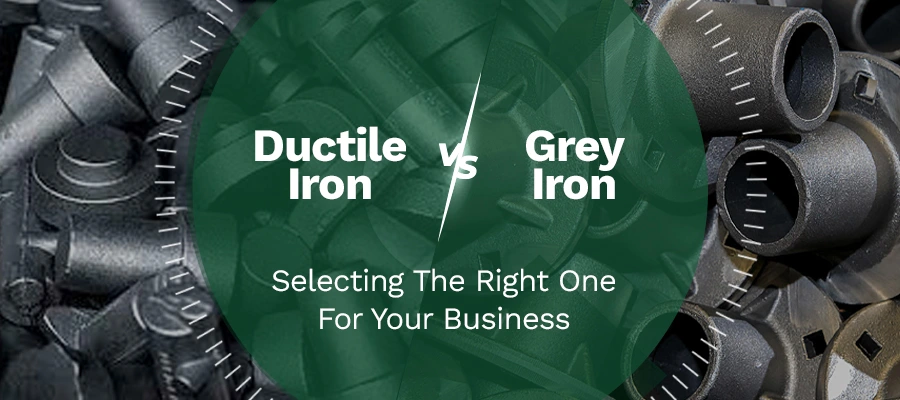
Ductile Iron Vs Grey Iron: Selecting The Right One For Your Business
Are you finding it difficult to choose between Ductile Iron and Grey Iron for your next project? Most of the businesses have to take this tough decision. The material you have selected will define the performance, durability, and cost-effectiveness of your product.
So let's enter into further details to guide you in making the right choice that fits your needs.
Ductile Iron – What Are They?
What exactly is this ductile iron anyway? Also known as nodular iron, it is a type of cast iron that is extremely ductile and strong. The whole process of casting comes about by adding small batches of magnesium to the molten iron – altering its carbon structure and thus consequently enhancing the mechanical properties.
Advantages of Ductile Iron
The benefits of ductile Iron are numerous. It includes –
- High Tensile Strength: It has tensile strength like steel, and is thus applied in high-load usage.
- Impact Resistance: It is good at absorbing shocks, meaning it shows fewer failures in demanding environments.
- Corrosion Resistance: It tends to increase the lifespan of the components.
- Versatility: From a small block of the automobile to heavy machinery, ductile iron fits a wide variety of casting applications
Isn’t it good to have a material that can absorb the shock and stresses without any breakage?
Grey Iron – What Are They?
Grey iron is the most versatile cast iron alloy. Its name is derived from its fracture surface which has a grey color due to flake-like Graphite structure.
Properties of Grey Iron
The properties of Grey Iron are
- Very Good Machinability: It can be cut easily making it the favourite material for intricate designs.
- Thermal Conductivity: Grey Iron is very suitable for engine blocks and heat exchangers because it can bear immense heat.
- Vibration Dampening: It can reduce vibrations; which helps to improve machinery and equipment performance through vibration absorption.
- High wear Resistance: This material is high wear resistant making it a suitable part for heavy friction processes.
Don’t you need materials that can absorb vibrations effectively to help improve your product's performance?
Ductile Iron Vs. Grey Iron: Key Difference
When you select the right material for the business, it is crucial to understand the key differences.
- Mechanical Properties:
- Ductile iron is stronger, more tensile and yield but far better suited for heavy-duty applications.
- Although grey iron is weaker, it has better damping ability best suited for application sensitives towards vibration.
- Cost Considerations:
- Ductile iron is more expensive to manufacture since its process is a little more complicated
- Grey iron, on the other hand, is less expensive, and indeed, it's quite a sizeable difference in budget for most of the projects
- Strength and Wear Resistance:
- Ductile iron does well for strength and impact resistance applications
- The properties of grey iron make it more suitable for applications where wear resistance and vibration damping are critical.
How do these properties affect your particular application? Knowing the differences can help you make the right choice.
Industrial Applications – Where Are They Used?
Where are these materials widely used? Here are the industrial applications of Ductile Iron and Grey Iron:
Ductile Iron: Ductile iron is highly utilized in those industries where the components require strength and durability. The industries include automotive, construction, mining, oil & gas, and agriculture.
Grey Iron: Grey Iron is widely used in industries where the parts need complex designs and vibration dampening. The industries include manufacturing, aerospace, automotive, construction, and railway.
Which material supports your project goals?
How To Select The Right Material For Your Business?
Selecting between ductile iron and grey iron is not just about understanding the facts, but more about the assessment of your specific needs. Some questions to think through are;
- What are the mechanical requirements for your application?
- Are you overemphasizing cost or performance?
- What is the importance of the lifespan of a component?
Real-world applications often yield excellent insight in their own right. For example, if you're making parts for heavy machinery, possibly ductile iron will provide the durability you need.
And when your project involves casting a block, then grey iron might be the better fit as it has some good casting properties.
In Summary
Do you still get confused between Ductile Iron and Grey Iron? It is the answer that makes all the difference in some specific needs and usage. In this case, strength and ductility would be brought in by Ductile Iron, while machinability and thermal conductivity would bring in Grey Iron.
Have you chosen the material which you would like to work with for your business projects? Do not worry if you have not, reach out to Veejei Automation for professional help!





